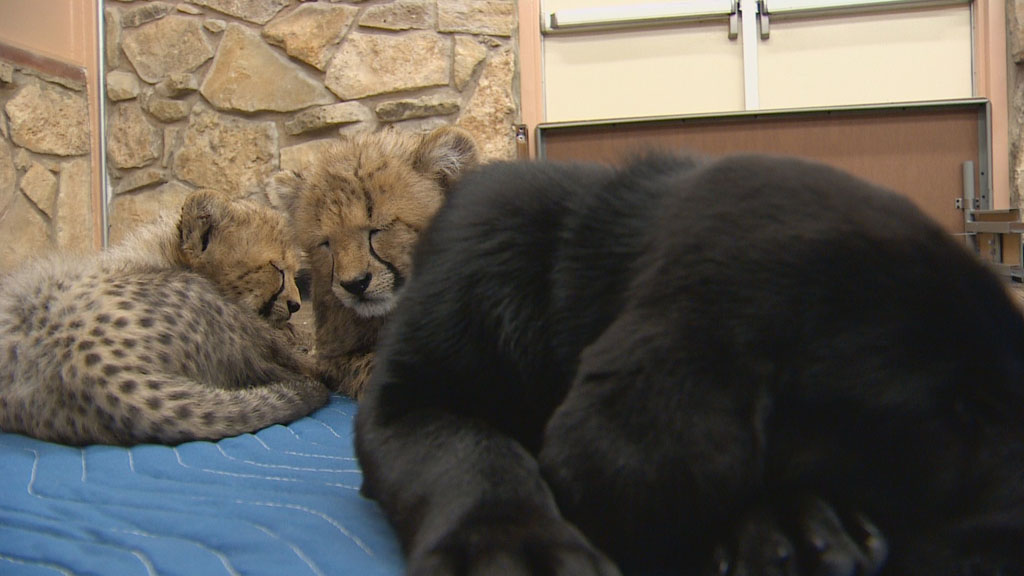DALLAS Winspear and Kamau have a new roommate.
On Friday, the two 9-week-old cheetah cubs are getting to know their Labrador puppy Amani. As the Dallas Zoo notes on its website, animal experts have learned that the labrador will be a 'calming influence' on the two cheetah cub and be their playmate through adulthood.
Still cheetah and labrador? A match made in heaven? I'm sure you have some questions, and my children certainly did. So we posed them to a Zoo official on Friday. Their answers are below.
From Luke, 11:
1.When the cheetahs grow up, will the dog live with them all day and all night?
Yes, thethree boys will live together. Until our Animal Adventures staff is certain that they're fully comfortable and bonded with each other, they are supervised at all times when together.
2.Once the animals get used to each other, what will the cheetahs do if the dog leaves the habitat?
The animals will live together for their entire lives, but will also be trained so that they're OK with being separated from one another. This will allow us to take only one of them to an outside appearance, for instance.
3.What if the cheetahs attack the dog? Will the cheetahs get punished?
No. We make this a positive experience for the cheetahs and the dog. Through positive reinforcement training, we reward the behavior we like to see. That type of positive reinforcement is the key to success in animal training here at the zoo.
4.Where is the cheetahs' mother?
She's in Front Royal, Va., at the Smithsonian Conservation Biology Institute, a leader in animal conservation efforts. She had five cubs, which is a large litter for a mother cheetah. Kamau and Winspear are being hand-raised because they're part of our Animal Adventures program and must be acclimated enough to visit schools, hospitals and other public places to teach about conservation.
From Jackson, 14:
5.What is the growth rate of the Labrador to the cheetah?
Right now, the puppy weighs about twice what the cubs weigh. That's why we're extra-careful while they're getting to know each other. Puppies like to play, and we have to be sure he doesn't pounce on the cubs and hurt them! They'll grow at about the same rate; when grown, we expect all three to weigh about 90 pounds.
6.Once the cheetahs get bigger than the dog, will the dog be in danger?
No, Amani won't ever be in danger, for several reasons. First, they'll grow up together, so they'll be bonded to each other and will see each other as family. Second, he'll be big enough to hold his own. Amani's parents are both large dogs, and that was one reason we chose him. Thirdly, our animal care staff has a great deal of experience with animal behavior and would be able to address any problems before they develop.
From Olivia, 12:
7.Why did you pick a dog, instead of another animal to be the cheetahs' friend?
There have been many success stories with dogs and other species. Many people have a dog and cat at home, and realize that they can get along great together. The Labrador retriever is a strong, calm, loyal breed, and when they're outside the Zoo making visits to hospitals and schools, the cheetahs will take their cues from the dog. He'll be calm and mellow, and that will help the cheetahs remain that way, too.
8.What is the lifespan of the cheetah, compared to the dog?
They're about the same, about 12 years. Although as with any species, that number can be shorter or longer for an individual animal.
9.If one of them dies, how will that affect the others?
They may grieve for the one who's gone, as any littermate might. But death is part of the circle of life, and animals are very resilient. And it's not uncommon for cheetahs who are raised together to splinter off to live solitary lives, so they're wired to adjust to comings and goings. In addition, they will always have their human friends with whom they develop special bonds.


